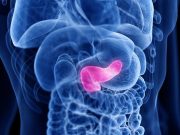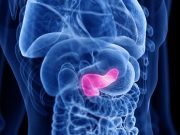Tag: Cancer: Pancreatic
2000 to 2021 Saw Increase in Incidence of Pancreatic Adenocarcinoma
Increase seen across age groups, while incidence of colorectal adenocarcinoma increased most in those aged 15 to 34 years
Disparities Evident in Treatment, Survival for Patients With Pancreatic Cancer
Lower odds of receiving key components of quality care seen for those with high overall social vulnerability index
Nanosensor Assay Promising for Pancreatic Cancer Detection
In recent study, PAC-MANN identified pancreatic ductal adenocarcinoma samples with 98 percent specificity and 73 percent sensitivity across all stages
Entinostat + Nivolumab Yields Durable Results in Some Pancreatic Cancer Patients
Primary end point not met, but small subset of advanced pancreatic ductal adenocarcinoma patients showed durable responses
Study Looks at Increasing Incidence of Pancreatic Cancer in Younger Adults
Increasing incidence mainly due to increased detection of smaller, early-stage endocrine cancer, not adenocarcinoma
Anxiety, Depression Increased in Pancreatic Cancer Patients With Palliative Care Consult
Palliative care consultations have no significant impact on the likelihood of documented treatment
Most Adults Lack Knowledge About Pancreatic Cancer
Most people erroneously think pancreatic cancer occurs only in older people and that they cannot alter risk
Metabolic-Bariatric Surgery Tied to Reduced Risk for Pancreatic Cancer in Those With Obesity
Reduced risk was more pronounced in those with type 2 diabetes, but was also seen in those without T2D
Omitting 5-FU Bolus Does Not Reduce Survival in Advanced Cancer
However, omission does result in reductions in neutropenia, thrombocytopenia, and use of granulocyte colony-stimulating factor
Most Patients With Stage I PDAC Are Upstaged on Histopathology
More than 70 percent with stage I pancreatic ductal adenocarcinoma and about 30 percent with stage II PDAC upstaged after surgery














